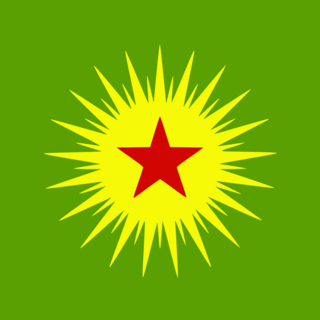
A government is the system or group of people governing an organized community, generally a state.
Individualism is the moral stance, political philosophy, ideology and social outlook that emphasizes the intrinsic worth of the individual. Individualists promote realizing one's goals and desires, valuing independence and self-reliance, and advocating that the interests of the individual should gain precedence over the state or a social group, while opposing external interference upon one's own interests by society or institutions such as the government. Individualism makes the individual its focus, and so starts "with the fundamental premise that the human individual is of primary importance in the struggle for liberation".

Political philosophy or political theory is the philosophical study of government, addressing questions about the nature, scope, and legitimacy of public agents and institutions and the relationships between them. Its topics include politics, liberty, justice, property, rights, law, and the enforcement of laws by authority: what they are, if they are needed, what makes a government legitimate, what rights and freedoms it should protect, what form it should take, what the law is, and what duties citizens owe to a legitimate government, if any, and when it may be legitimately overthrown, if ever.
A state is a political entity that regulates society and the population within a territory. Government is considered to form the fundamental apparatus of contemporary states.

The right of a people to self-determination is a cardinal principle in modern international law, binding, as such, on the United Nations as authoritative interpretation of the Charter's norms. As a principle of international law it is related to the concepts of equal rights, political liberty and representative government with full suffrage; the legitimacy of the territorial status quo depends upon representative government and equal rights. Essentially, those subject to the jurisdiction of the state and its laws must enjoy the same political liberties "without distinction as to race, creed or color". It is wrong to state the principle as "the right freely to determine...political status". Rather, it strongly implies the equality of political rights in a "one man, one vote" democratic government and free and full participation in the political process.

In moral and political philosophy, the social contract is an idea, theory or model that usually, although not always, concerns the legitimacy of the authority of the state over the individual. Conceptualized in the Age of Enlightenment, it is a core concept of constitutionalism, while not necessarily convened and written down in a constituent assembly and constitution.
Group rights, also known as collective rights, are rights held by a group as a whole rather than individually by its members; in contrast, individual rights are rights held by individual people; even if they are group-differentiated, which most rights are, they remain individual rights if the right-holders are the individuals themselves. Historically, group rights have been used both to infringe upon and to facilitate individual rights, and the concept remains controversial.
In developmental psychology and moral, political, and bioethical philosophy, autonomy is the capacity to make an informed, uncoerced decision. Autonomous organizations or institutions are independent or self-governing. Autonomy can also be defined from a human resources perspective, where it denotes a level of discretion granted to an employee in his or her work. In such cases, autonomy is known to generally increase job satisfaction. Self-actualized individuals are thought to operate autonomously of external expectations. In a medical context, respect for a patient's personal autonomy is considered one of many fundamental ethical principles in medicine.
Some philosophers distinguish two types of rights, natural rights and legal rights.
Popular sovereignty is the principle that the leaders of a state and its government are created and sustained by the consent of its people, who are the source of all political legitimacy. Popular sovereignty, being a principle, does not imply any particular political implementation. Benjamin Franklin expressed the concept when he wrote that "In free governments, the rulers are the servants and the people their superiors and sovereigns".
Governmentality is a concept first developed by the French philosopher Michel Foucault in the later years of his life, roughly between 1977 and his death in 1984, particularly in his lectures at the Collège de France during this time.

Liberty is the state of being free within society from oppressive restrictions imposed by authority on one's way of life, behavior, or political views.
"Two Concepts of Liberty" was the inaugural lecture delivered by the liberal philosopher Isaiah Berlin before the University of Oxford on 31 October 1958. It was subsequently published as a 57-page pamphlet by Oxford at the Clarendon Press. It also appears in the collection of Berlin's papers entitled Four Essays on Liberty (1969) and was reissued in a collection entitled Liberty: Incorporating Four Essays on Liberty (2002).

Merdeka is a term in Indonesian and Malay which means "independent" or "free". It is derived from the Sanskrit maharddhika (महर्द्धिक) meaning "rich, prosperous, and powerful". In the Malay archipelago, this term had acquired the meaning of a freed slave. The term is also used in other Indonesian languages.
The history of political thought encompasses the chronology and the substantive and methodological changes of human political thought. The study of the history of political thought represents an intersection of various academic disciplines, such as philosophy, law, history and political science.
Liberalism is a political and moral philosophy based on the rights of the individual, liberty, consent of the governed, political equality, right to private property and equality before the law. Liberals espouse various and often mutually warring views depending on their understanding of these principles but generally support private property, market economies, individual rights, liberal democracy, secularism, rule of law, economic and political freedom, freedom of speech, freedom of the press, freedom of assembly, and freedom of religion, constitutional government and privacy rights. Liberalism is frequently cited as the dominant ideology of modern history.

Democratic confederalism, also known as Kurdish communalism or Apoism, is a political concept theorized by Kurdistan Workers Party (PKK) leader Abdullah Öcalan about a system of democratic self-organization with the features of a confederation based on the principles of autonomy, direct democracy, political ecology, feminism, multiculturalism, self-defense, self-governance and elements of a cooperative economy. Influenced by social ecology, libertarian municipalism, Middle Eastern history and general state theory, Öcalan presents the concept as a political solution to Kurdish national aspirations, as well as other fundamental problems in countries in the region deeply rooted in class society, and as a route to freedom and democratization for people around the world.
Digital self-determination is a multidisciplinary concept derived from the legal concept of self-determination and applied to the digital sphere, to address the unique challenges to individual and collective agency and autonomy arising with increasing digitalization of many aspects of society and daily life.







